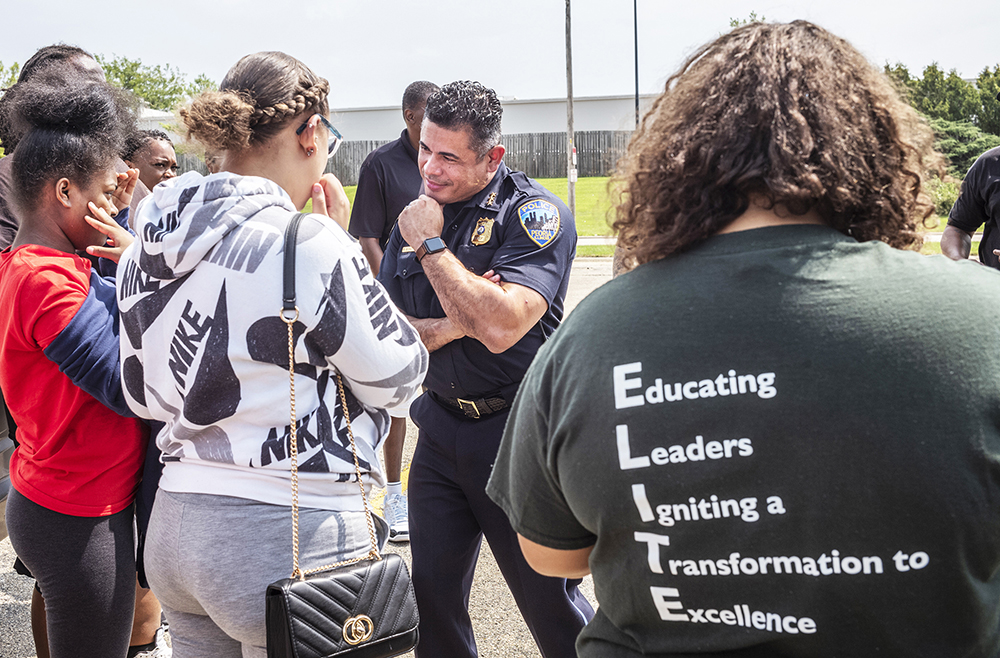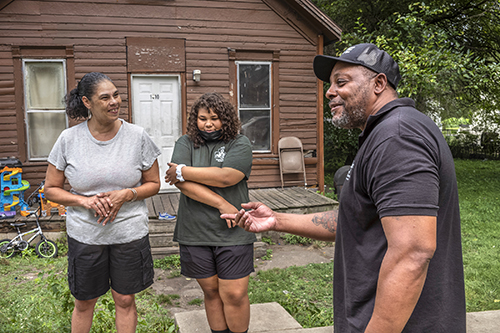
Just days after starting his new job, Peoria Police Chief Eric Echevarria meets students in the summer “W.I.N.N.I.N.G.” program directed by Carl Cannon. The students needed to complete this summer program in order to be promoted to ninth grade. Chief Echevarria also met with Cannon’s ELITE “game changers,” men and women who made mistakes that sometimes landed them in prison. Following their release, they enrolled in training to become mentors for students and use their own histories to steer students away from the same mistakes they made. (PHOTO BY DAVID ZALAZNIK)
The pandemic robbed hope from countless students across the country, but 26 young people in Peoria who had been struggling with remote learning got back on track during a special summer program.
Then they got an added surprise with an unexpected pep talk by Peoria’s new police chief.
Just days into his new job, Chief Eric Echevarria carved out time from his schedule to meet the group.
The mood was upbeat. Students had successfully completed the seven-week program with 6 ½ hours each day of math, language arts and reading comprehension. There were practice job interviews, public speaking and lots of one-on-one coaching.
When the chief met with these students, they were about to go to a movie at Landmark Cinemas to celebrate their promotion to ninth grade. There was soda, popcorn and a sense of accomplishment.
Chief Echevarria congratulated them on successfully completing the program and told them he has an open-door policy if anyone ever needs to talk.
“We’re here for you,” he said.
He’s the first Latino named to the position of chief, he told them.
“You can be what you want to be, but it takes work, it takes practice,” he said. “Keep up the great work. Stay on course. Sometimes it’s easier to do what’s not right, but that never pays off in the long run.”
He’s an example, he said, of how people can overcome barriers and achieve their dreams if they focus and work. He’d made mistakes growing up but two strong parents helped him refocus and get back on course.
Carl Cannon, a former prison guard, is the founder of Peoria’s ELITE program. He and his ELITE team staffed this Peoria Public School’s summer program called W.I.N.N.I.N.G. (What I Need Now in The Ninth Grade.) With both ELITE and W.I.N.N.I.N.G., Cannon matches students with specially-trained “game changers,” people who often know firsthand the challenges of school, the dangers of gangs and the despair of incarceration.
Winnifred “Winnie” Calloway, 15, earned the points necessary for promotion to ninth grade by participating in this program. She plans to transfer to a school in Missouri where her father lives and where she can get a fresh start.
The pandemic had exacerbated her attendance problems and “the whole thing with keeping up by computers threw me off,” she said. “This program gave me hope. Without this program, I had been sad, feeling like I didn’t belong anywhere. I’m nervous but hopeful and looking at ninth grade as an opportunity.”
Her “game-changer” in the program was Robert Bell who has experience with incarceration.

Tenner Calloway, left, and her daughter Winnie tell Robert Bell the W.I.N.N.I.N.G. program opened their eyes to possibilities. Tenner said she enjoyed seeing a transformation in her daughter over the seven-week summer program. Bell is a “game-changer” with the program, helping students with attendance, going on home visits and generally staying in touch. If he discovers unmet needs his students are experiencing, he has a network of support he can avail for help. (PHOTO BY DAVID ZALAZNIK)
“Hearing from him and his backstory helps. I don’t want to do that. I don’t want to deal with gangs,” Calloway said. “I want to stay in school and in college. I have learned how to meet people. How to talk louder. How to focus.”
Her mother, Tenner Calloway, said the program was an eye-opener.
“This program showed us there is something for Winnie out there. The program teaches how to be respectful, have manners, speak well,” she said. “Winnie is now a good role model. I enjoyed watching the transformation in her.”
Asked if they would stay in contact with their “game changer” after her daughter moves to Missouri, she said, “Oh yes. Definitely. We’ll keep in touch with Mr. Bell and he’ll keep track of his kids.”
Robert Bell is a game changer in the ELITE program during the regular school year and in this special summer program. In that role, he stays in touch with students and keeps track of their academic and emotional needs.
Asked about the Peoria Police Chief coming to talk with the kids, Bell said, “He’s right on point. I love that he took time to come and address us. It’s important for the chief to get to know the community.”
Bell operates a boxing club in downtown Peoria that stresses character development, anti-bullying, self-esteem and lots of physical workouts. Chief Echevarria told the group he had been a boxer and made a comeback but his wife put a stop to that.
“She said there was too much blood on the garage floor,” he said.
That garnered lots of laughter but also hope that the chief planned to play an active role in the community. Echevarria said he definitely plans to stop by the boxing club.
“I love that he said that. He’s going to get my help,” Bell said. “Anything I can do to help him learn about the neighborhood and individuals.”
Cannon believes self-discipline is an essential skill students need to cultivate.
“Take your version of ‘cool’ and toss it out. Being cool is a trap. You are OK being you,” he told the students.
One mother told the police chief her son didn’t talk, and that was often misconstrued as a behavior problem.
“He doesn’t have behavior problems. He just didn’t talk. It was social anxiety, not a behavior problem. This program has helped him speak up,” she said.
In a booming baritone, Cannon grills his students “What’s the word?” The loud chorus of response is “focus.”
Derrick Booth, director of social and emotional learning with Peoria Public Schools, said there is money in the budget for this program to be offered again next summer.
He said this program doesn’t end with the conclusion of classes.
“These game-changers continue to work with their students, monitor their progress, stay in touch with the families, develop relationships,” he said. “They work with students not just monitoring academics and attendance but establishing trust. When there are challenges, whether school or personal, these game changers help connect with supports and resources. You name it, we help them.”
Booth said 80% of people who are incarcerated do not have a high school diploma. Failing to be promoted from year to year and being retained to repeat a grade increases the risk of students dropping out of school altogether.
Without a high school degree, there is higher risk of unemployment, entering the criminal justice system and low health outcomes.
Investing in programs to help students stay in school and graduate pays off many fold.
“The population with limited education creates a huge cost to society,” Booth said. “Invest in the front end and the pay off on the back end is even bigger. As a society, investing is giving the opportunity for jobs and skills and pay back into the economy.”
“Most of the students who enrolled in the W.I.N.N.I.N.G. program had no idea what they wanted to do with their lives,” Booth said. “This program was the start for them to believe in themselves and dream about a future.”

1 comment for “School for algebra, language arts and hope”